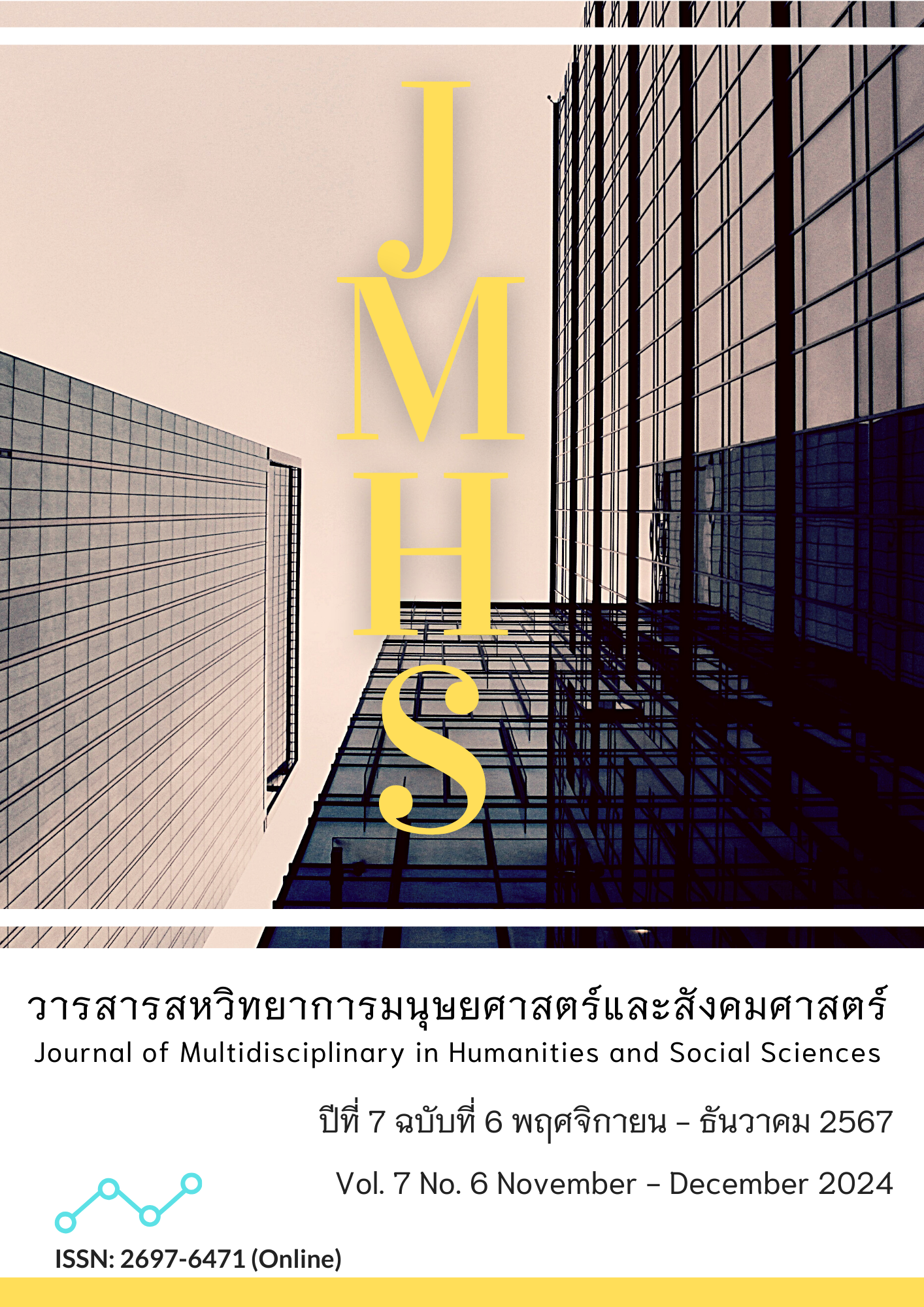An Application of the Buddhadamma Principles for Healing Before the Loss of Eyes in Mettapracharak Hospital (Watraikhing), Nakhon Pathom Province
Main Article Content
Abstract
This article aims to present a model for applying Buddhist principles to heal the minds of patients before they lose their eyesight at Metta Pracharak Hospital (Wat Rai Khing). The method used for participatory action research was used to collect data by conducting in-depth interviews with 18 key informants, divided into 2 groups: 1) a group of professional nurses and caregivers (3 people); 2) a group of patients receiving vision treatment (15 people); and focus group discussions with 6 participants, divided into 2 groups: 1) a group of experts in Buddhism (3 people); and 2) a group of professional nurses who take care of eye patients (3 people). The workshop on applying Buddhist principles to heal the minds of 39 patients before they lose their eyesight was organized. The data was then categorized, analyzed using content analysis, contextual analysis, and presented in a descriptive manner in accordance with the research objectives. The results of the research found that 1) the process of healing the minds of patients at Metta Pracharak Hospital (Wat Rai Khing), Nakhon Pathom Province, was divided into 3 processes. 2) The application of Buddhist principles to heal the minds of patients before they lose their eyesight at Metta Pracharak Hospital (Wat Rai Khing), Nakhon Pathom Province In each process, the principles of Buddhism are applied as follows: (1) Relationship building process using the principle of Kalyanamitra (2) Morale building process using the principle of Trilaksana (3) Cooperation building process using the principle of Right Speech (Samma Speech). 3) Model of application of Buddhist principles to heal the minds of patients before they lose their eyes at Metta Pracharak Hospital (Wat Rai Khing), Nakhon Pathom Province, using the 3 Create 3 Dharma model as follows: 1) Relationship building 2) Morale building 3) Cooperation building by integrating 3 principles: 1) Kalyanamitra principle 2) Trilaksana principle 3) Right Speech.
Knowledge gained from research by integrating Buddhist principles with the healing process of patients’ minds before and after they lose their eyes can be applied to benefit Metta Pracharak Hospital (Wat Rai Khing), Nakhon Pathom Province.
Article Details

This work is licensed under a Creative Commons Attribution-NonCommercial-NoDerivatives 4.0 International License.
Views and opinions appearing in the Journal it is the responsibility of the author of the article, and does not constitute the view and responsibility of the editorial team.
References
ก่องแก้ว เจริญอักษร. (2545). การพัฒนาบุคลิกภาพตามแนวพุทธ. กรุงเทพฯ: โรงพิมพ์แห่งจุฬาลงกรณ์มหาวิทยาลัย.
กุลนันท์ บุญมาก. (2566). พยาบาลวิชาชีพชำนาญการ โรงพยาบาลเมตตาประชารักษ์ (วัดไร่ขิง). สัมภาษณ์, 3 ธันวาคม.
จันทิมา แสงแพร และ พระครูปลัดสุวัฒน์ สุวฑฺฒโน. (2564). หลักธรรมเพื่อการเยียวยาจิตใจต่อภาวะซึมเศร้าในสังคมปัจจุบัน. วารสารพุทธมัคค์, 6(2), 218-228. สืบค้นจาก https://so01.tci-thaijo.org/index.php/bdm/article/view/246318
ปรียพร วิศาลบูรณ์, สุรัมภา รอดมณี, เนาวนิจ พึ่งจันทรเดช และ เบญญาภา ทนต์ประเสริฐเวช. (2566). จิตบำบัดตามแนวพุทธจิต: บทวิเคราะห์ในมิติทางการพยาบาล. วารสารสหวิทยาการมนุษยศาสตร์และสังคมศาสตร์, 6(1), 120-140.สืบค้นจาก https://so04.tci-thaijo.org/index.php/jmhs1_s/article/view/261601
พระเทพสุวรรณเมธี (สุชาติ หวลจิตต์) และ สุพิชฌาย์ พรพิชณรงค์. (2562). พระจิตอาสาคิลานธรรม: รูปแบบและกระบวนการเยียวยาใจผู้ป่วยด้วยธรรมะ. วารสารสันติศึกษาปริทรรศน์ มจร, 7(6), 1786-1796. สืบค้นจาก https://so03.tci-thaijo.org/index.php/journal-peace/article/view/ 216842
พระธรรมปิฎก (ป.อ.ปยุตฺโต). (2539). ธรรมกับการพัฒนาชีวิต. (พิมพ์ครั้งที่ 2). กรุงเทพฯ: ธรรมสภา.
พระปลัดสมชาย ดำเนิน และ พระมหานันทวิทย์ ธีรภทฺโท. (2562). การพัฒนาตัวชี้วัดพฤฒพลังวิถีพุทธของผู้สูงอายุกลุ่มผู้เกษียณราชการ. วารสารบัณฑิตศึกษามหาจุฬาขอนแก่น, 6(3), 209-228. สืบค้นจาก https://so02.tci-thaijo.org/index.php/jg-mcukk/article/view/208207
พระสุรัศ สุขขุนทด, พระธีรพล คำสิงห์ใส และ จันทรัสม์ ตาปูลิง. (2565). หลักพุทธธรรมในการเสริมสร้างความสุขสำหรับผู้สูงอายุ. วารสารสิรินธรปริทรรศน์, 23(1), 296-303. สืบค้นจาก https://so06.tci-thaijo.org/index.php/jsrc/article/view/248532
ภัสรดา พลายงาม. (2566). พยาบาลวิชาชีพชำนาญการ โรงพยาบาลเมตตาประชารักษ์ (วัดไร่ขิง). สัมภาษณ์, 3 ธันวาคม.
มหาจุฬาลงกรณราชวิทยาลัย. (2539). พระไตรปิฎกภาษาไทย ฉบับมหาจุฬาลงกรณราชวิทยาลัย.กรุงเทพฯ: โรงพิมพ์มหาจุฬาลงกรณราชวิทยาลัย.
ยุวดี บำรุงบุตร. (2566). อาสาสมัครพัฒนาสังคมและความมั่นคงของมนุษย์กับ การเสริมสร้างสังคมสันติสุข. วารสารนวัตกรรมการจัดการศึกษาและการวิจัย, 5(1), 223-232. สืบค้นจาก https://so02.tci-thaijo.org/index.php/jemri/article/view/258596
โรงพยาบาลบางปะกอก. (2564, 6 สิงหาคม). 4 ปัญหาโรคตาภัยใกล้ตัวมนุษย์ออฟฟิศ. สืบค้นเมื่อ 7 มกราคม 2566, จาก https://www.bpksamutprakan.com
โรงพยาบาลบำรุงราษฎร์. (2561). ปัญหาสุขภาพตาที่ตามมากับวัยที่เพิ่มขึ้น. สืบค้นเมื่อ 7 มกราคม 2566, จาก https://www.bumrungrad.com
โรงพยาบาลเมตตาประชารักษ์ (วัดไร่ขิง). (2554). คู่มือการดูแลรักษาผู้ป่วยอุบัติเหตุทางตาเบื้องต้น. นครปฐม: โรงพยาบาลเมตตาประชารักษ์ (วัดไร่ขิง).
สุวรรณี ไวท์, สิริวัฒน์ ศรีเครือดง และ สุวัฒสัน รักขันโท. (2564). พุทธจิตวิทยากับการพัฒนาตนให้มีความสุข. วารสาร มจร มนุษยศาสตร์ปริทรรศน์, 7(1), 425-440. สืบค้นจาก https://so03.tci-thaijo.org/index.php/human/article/view/252434
องอาจ นัยพัฒน์. (2554). การออกแบบการวิจัย : วิธีการเชิงปริมาณ เชิงคุณภาพ และผสมผสาน วิธีการ. (พิมพ์ครั้งที่ 2). กรุงเทพฯ: โรงพิมพ์แห่งจุฬาลงกรณ์มหาวิทยาลัย.
Damnoen, P. S., Siri, P., Supattho, P. S., & Kaewwilai, K. (2021). the development of student characteristics in according to the Nawaluk framework of the Buddhist integration of Buddhapanya Sri Thawarawadee Buddhist College. Asia Pacific Journal of Religions and Cultures, 5(2), 126–135. Retrieved from https://so06.tci-thaijo.org/index.php/ajrc/article/view/249662
Rogers, C. R. (1961). On becoming a Person. Boston: Houghton Mifflin.


